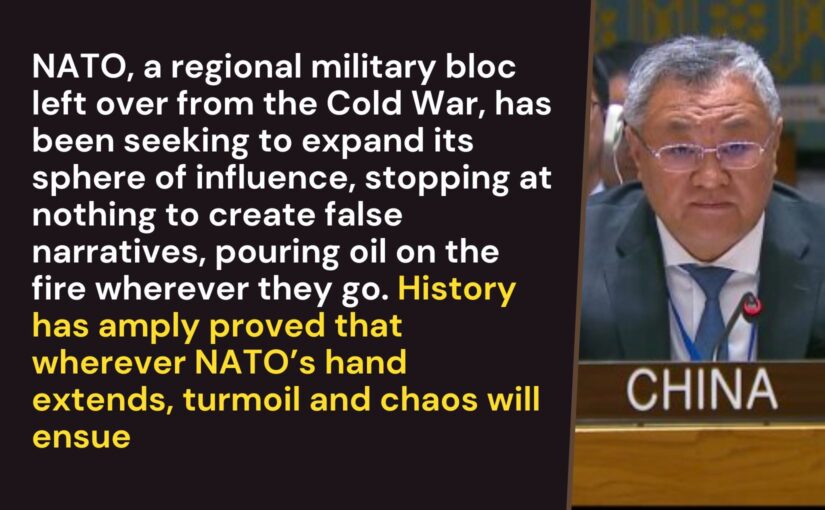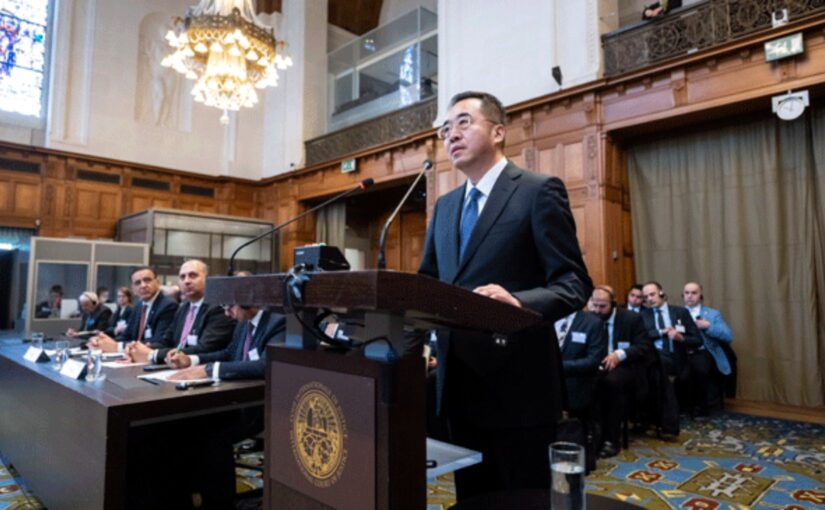On July 16, the United Nations Security Council held an Open Debate on ‘Multilateral Cooperation in the Interest of a More Just, Democratic and Sustainable World Order’. The meeting was convened on the initiative of the Russian Federation and chaired by Russian Foreign Minister Sergey Lavrov.
In his speech during the debate, China’s UN Ambassador Fu Cong, noted that the world body had been founded in 1945, to “save succeeding generations from the scourge of war” and continued:
“Since then, a large number of countries have emerged from waves of national independence and liberation.” Seventy years ago, “the Chinese leaders put forward the five principles of peaceful coexistence, namely, mutual respect for sovereignty and territorial integrity, mutual non-aggression, mutual non-interference in each other’s internal affairs, equality and mutual benefits, and peaceful coexistence. The five principles of peaceful coexistence embody the spirit of the [UN] Charter.”
Now, President Xi Jinping’s proposal of building a community with a shared future for humanity has been put forward with the aim of carrying forward the purposes and principles of the UN Charter and the five principles of peaceful coexistence under the new circumstances.
Fu Cong went on to say that today, “some obvious truths [are] being willfully distorted, while certain specious arguments gaining currency.” Responding to this, he continued, making pointed reference to a number of imperialist countries, principally the United States and Britain:
“We often hear the talk about a rules-based international order by some countries. But what kind of rules are they talking about? And who are the rule makers? No one has given us a clear and precise answer. In fact, the so-called rules-based international order advocated by some is really intended to create another system outside the existing system of international law and to seek legitimacy for double standards and exceptionalism. I would like to emphasise that there is only one order in the world, that is the international order based on international law. There is only one set of rules, and they are the basic norms governing international relations based on the purposes and principles of the UN Charter.”
And, while many peace-loving countries and people are working tirelessly to achieve peace in response to the conflicts in Ukraine and Palestine:
“NATO, a regional military bloc left over from the Cold War, has been seeking to expand its sphere of influence, stopping at nothing to create false narratives, pouring oil on the fire wherever they go, stirring up confrontation between camps, and even shifting the blame to countries outside the region to frame them on the issue of Ukraine.”
This last comment clearly refers to accusations levelled against China at NATO’s Washington Summit earlier in July, when China was ludicrously described as being a “decisive enabler” of Russia’s Special Military Operation.
Doubtless with such wars of aggression as those waged against Afghanistan and the former Yugoslavia in mind, Fu Cong went on to say that: “History has amply proved that wherever NATO’s hand extends, turmoil and chaos will ensue. China hereby advises NATO and certain countries to conduct some soul-searching and stop being the troublemakers who jeopardise common security at the expense of others.”
He also said that common development and common security are mutually reinforcing. A just and equitable international order cannot be built on the basis of developed countries getting ever richer while developing countries remain locked in poverty and the lack of development.
We reprint below the full text of Ambassador Fu Cong’s remarks. They were originally published on the website of China’s Permanent Mission to the UN.
President.
China appreciates Russia’s initiative to convene this open debate. I welcome Foreign Minister Sergey Lavrov presiding over today’s meeting.
To build a just, democratic, and sustainable international order is the joint pursuit of humanity. In 1945, to “save succeeding generations from the scourge of war”, our forefathers, upholding the spirit of multilateralism, established on the ruins of the Second World War the most universal, representative, and authoritative international organization, that is, the United Nations. The UN Charter, laying down the cornerstone of the modern international order and establishing the basic norms of contemporary international relations, is an embodiment of our noble ideal of working towards a just and equitable international order.
Continue reading History has amply proved that wherever NATO’s hand extends, turmoil and chaos will ensue

